Why Britain’s pubs are growing their own veg in order to survive
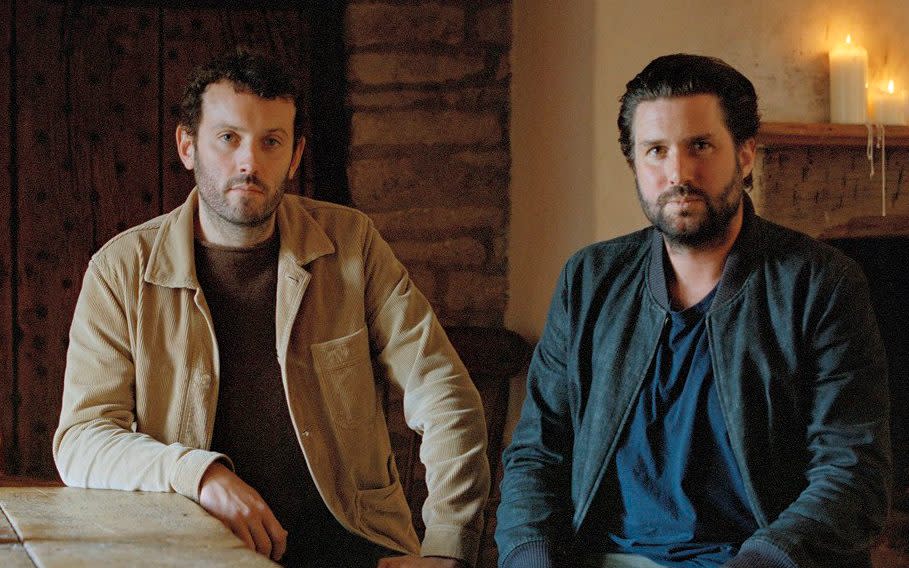
- Oops!Something went wrong.Please try again later.
Phil Winser says that when he owned a hospitality company in New York, Americans loved three things about Britain: “the Queen, David Beckham and pubs”. Now that he’s back on home turf in the Cotswolds, the Oxfordshire native is determined to add farming to that list of great British symbols.
Winser found himself trapped on a trip back to England at the beginning of the pandemic; by the time lockdown ended, he had lost his American business but found a new UK focus. “I’d spent so long selling food and wondered what the next chapter was for me,” Winser says. “I realised that I wanted to start growing food and become a farmer.”
Winser and his childhood friend-turned-business partner, James Gummer, reopened The Bull in Charlbury, a 16th-century pub with rooms, in July. There’s nothing unusual about two well-spoken chaps aged in their 30s opening a pub in these parts, not least a pair who already had The Pelican gastropub in London’s Notting Hill to their name. What is striking is their conviction that two endangered British industries – pubs and farming – can survive by helping each other.
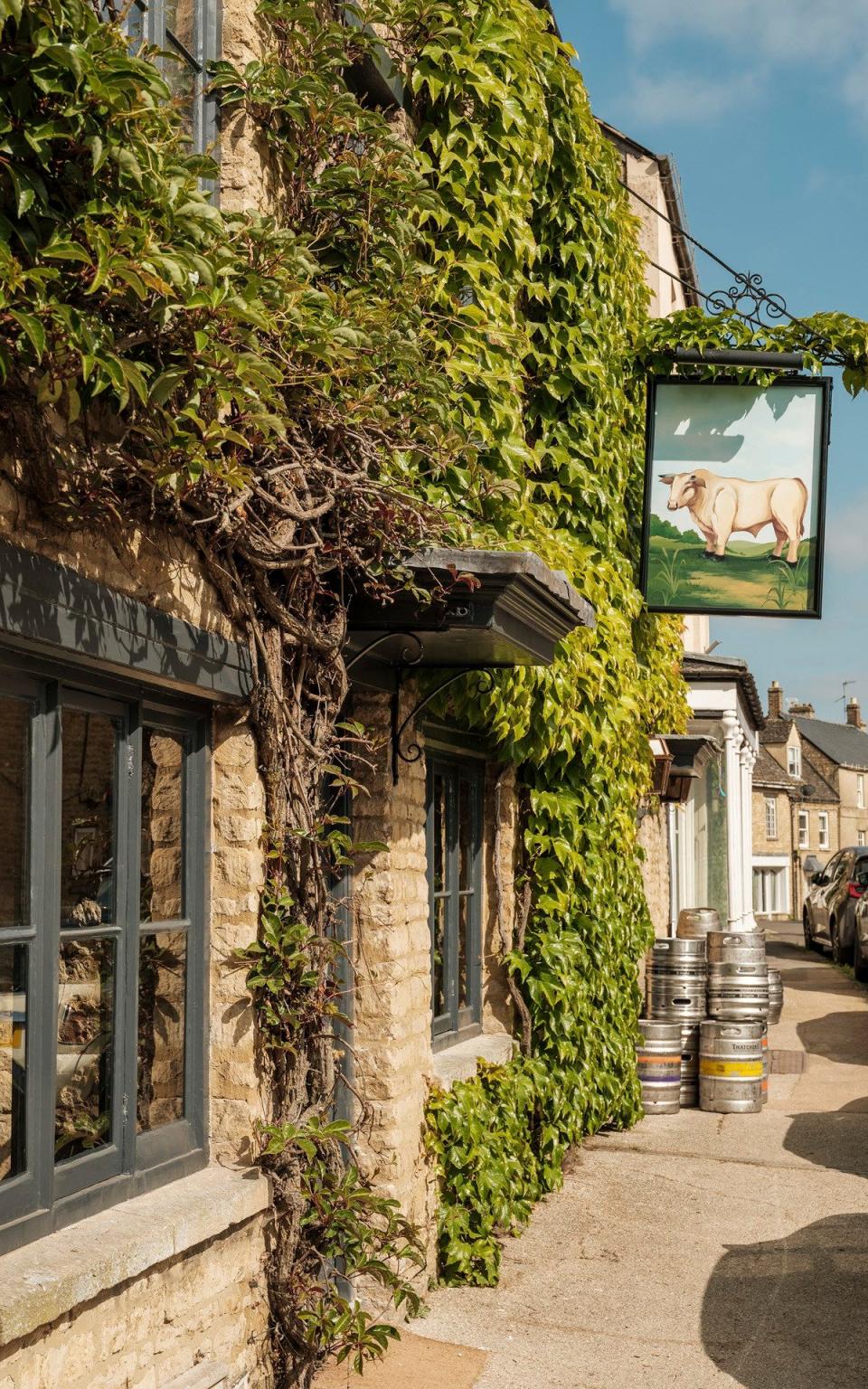
“A pub is very different to a restaurant, which is a transactional experience when you come for two hours to have a meal,” Winser says. “A pub is a community asset that’s used as an extension of the home. It’s the British form of hospitality and what we’re known for around the world. That was our starting point. If we want to connect our pub to British food, how could we use British ingredients on the menu to support British farmers?”
Data from real-estate analysts Altus Group reveals that 383 pubs closed in the first half of 2023, almost the total number for the whole of the previous year. The outlook is just as bleak for farming. Research from Riverford Organic Farmers, the fruit-and-veg box delivery company, suggests that almost half of British fruit and veg farmers fear they will go out of business within the next 12 months, with supermarket behaviour cited as a leading concern by 75 per cent of those surveyed.
“It’s not an easy thing to buy direct from a farm,” Gummer says. “It’s a lot simpler to place your order through a big supplier and things are delivered exactly when you want them.” However, working with the middlemen of wholesalers and cash-and-carrys, instead of directly with farmers, means higher costs and less control over quality and freshness. “We are trying to support the farmers who are growing in a certain way,” Gummer adds. “They’re working in a totally different world to the monocrop farmers who supply the supermarkets.”
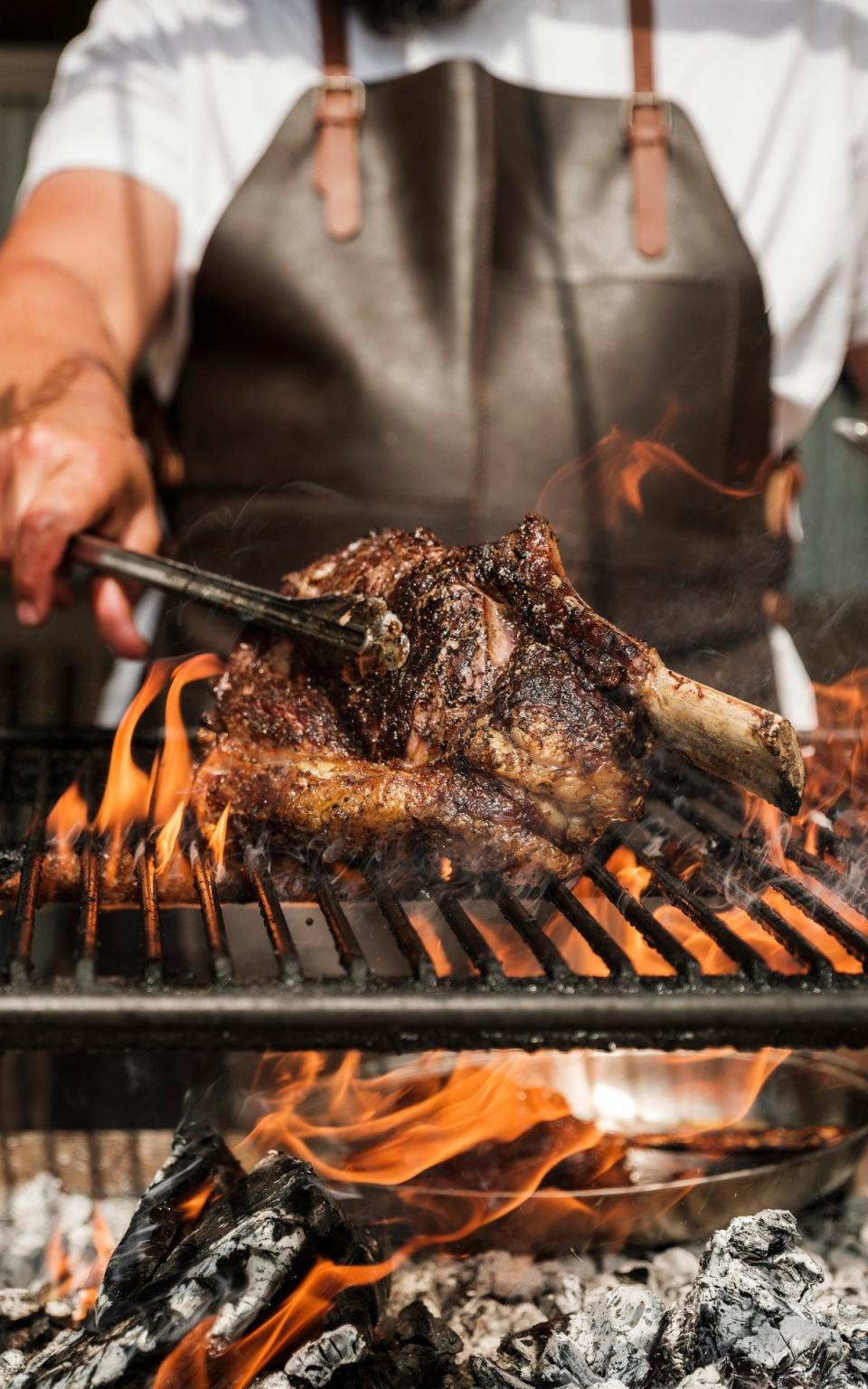
Things began with buying whole carcasses of meat direct from Whittington Lodge Farm near Cheltenham for The Pelican, where the mince on toast became the signature dish. “Whole butchery is perfect for pubs, because you can use all the different cuts in stews, soups and pies,” Gummer says.
For vegetables, Gummer and Winser took an even more hands-on approach, signing the lease on a one-acre plot at Bruern Farms, 10 miles from Charlbury, in April. What was a weed-covered wasteland has produced 180kg of tomatoes since May, as well as cucumbers so intensely flavoured they became a solo dish on the pub’s menu, delivered to the table four hours after being picked. The land is farmed bio-intensively, so when one bed is harvested, a crop of a different vegetable is planted. The farm is overseen by head grower Thomas Jones but the chefs from The Bull and The Pelican have been involved in the planting and the plan is that by next summer everyone who works for the company will have spent a day on the farm.
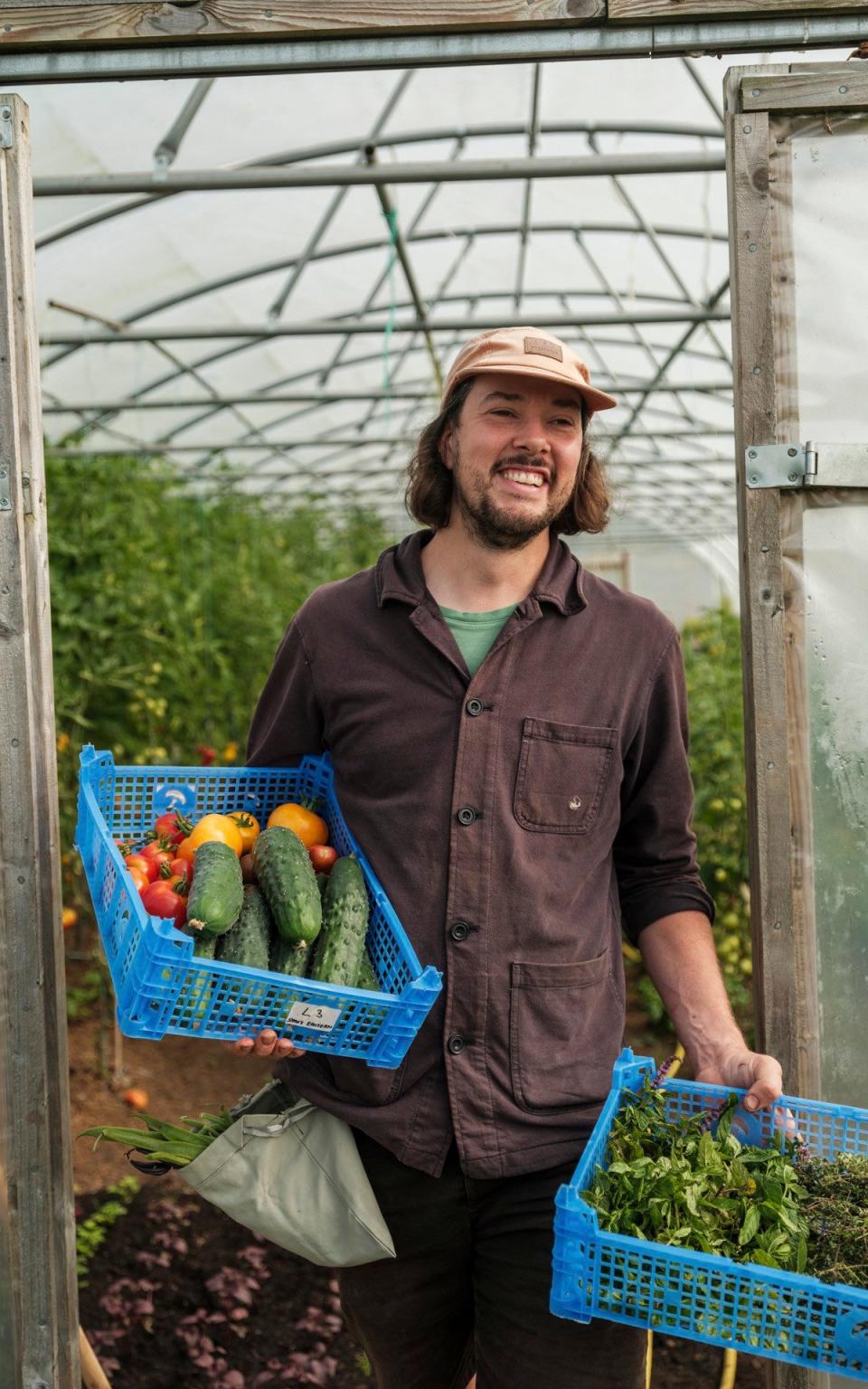
“We look at the farm as an independent business,” Winser says. “Can a diverse, non-monocrop-style farm like this be financially and environmentally sustainable? Michelin-starred restaurants like L’Enclume already have market gardens, but can we make the farm a profitable business, while still charging the prices a pub needs to charge?” Those prices, admittedly, hover around the £11 mark for a starter and £25 for a main, but the omens are good: with more pubs in the pipeline, the plan is to add an acre of farm every year for the next five years.
Charlbury’s street names pay tribute to a time when food was a more essential part of the local economy – Sheep Street, Fisher’s Lane, Market Street – but these days most locals do their shopping at the Co-op and there are more Chelsea tractors than the real thing hogging the narrow streets. Winser had his first pint at the Rose & Crown over the road, but says that the drinks-focused pub is a dying breed. “It does great beer and there’s not really anything to eat except pork scratchings. But pubs like this are struggling. There needs to be a food offering to make pubs work now.”
Two months after The Bull reopened, Lady Carole Bamford of Daylesford relaunched The Bell round the corner, leading to talk of Charlbury being the new Chipping Campden. Yet for all the Soho Farmhouse-style incomers, real farming remains a vital feature of the Cotswolds landscape. But could the ale-and-agriculture model proposed by The Bull work in an urban setting?
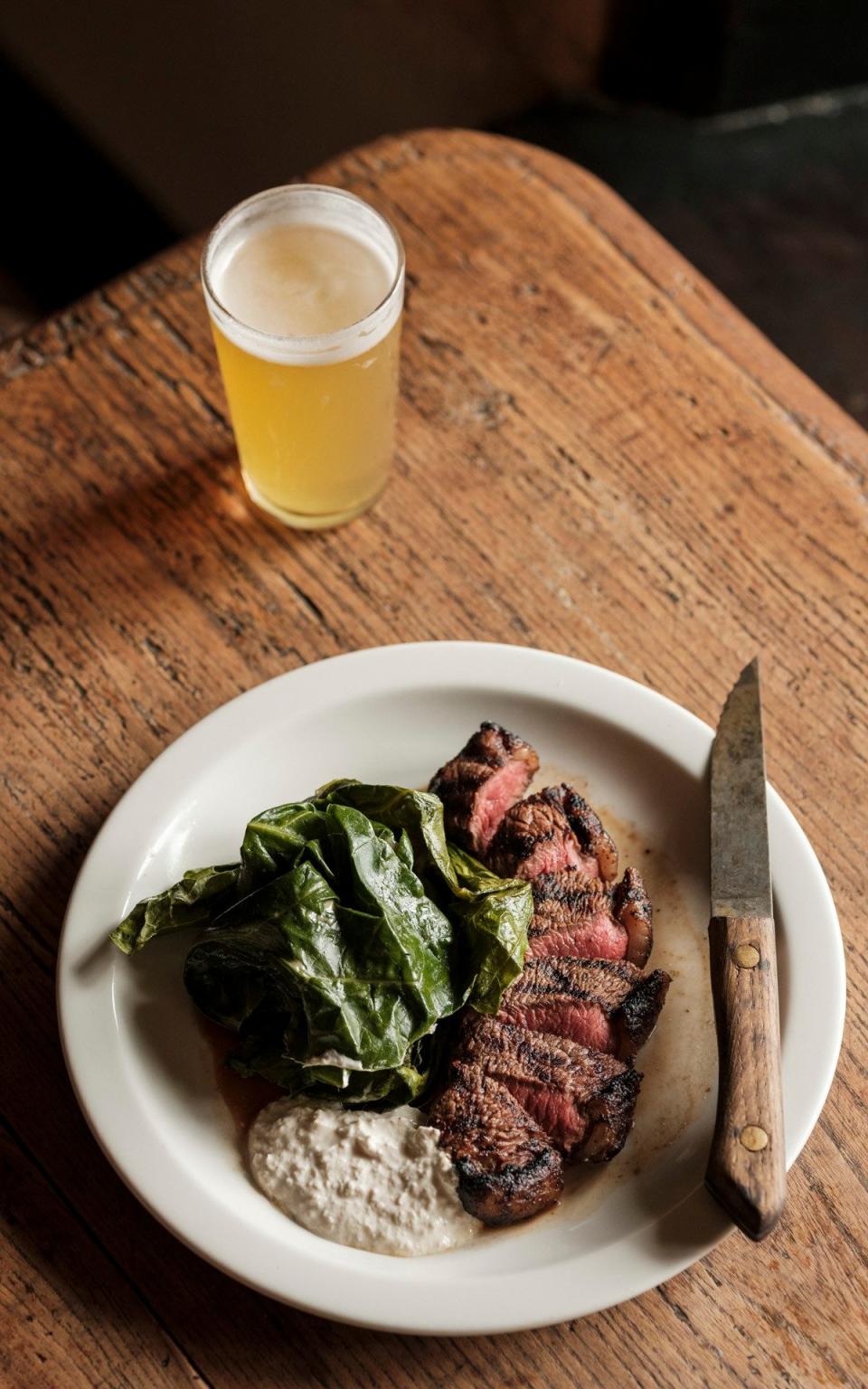
It’s a long way from the Cotswolds to Deptford, in every sense, though even in this gritty corner of south-east London there are Farrow & Ball window frames creeping in among the terraces overlooking Deptford Park. And in one corner of the square is a third-of-an-acre urban farm owned by the Culpeper Family of pubs, where four inches of topsoil has been laid over a fabric membrane on a sterile brownfield site.
There are rows of beetroot and kale, a greenhouse of tomatoes and peppers, and a coppice of spindly fruit trees propped against a fence waiting to be planted. The group’s executive chef director Peter Weeden admits that one row of cavolo nero would only feed 30 people and take three months to grow back; the group’s flagship pub, the organic Duke of Cambridge in Islington, serves 30,000 guests a year. Apart from giving chefs a break from the pressures of the kitchen – “Time doesn’t exist here,” Weeden notes poetically – why bother?
“If you genuinely want to change things, you have to convince other people that change is possible,” Weeden says. “We live in an age of detachment in which food production feels remote. Because Deptford Little Farm is in the middle of an urban area, masses of people can see how we’re growing food. And it’s a way of making sure that our chefs understand the time and effort required to grow something without chemicals, herbicides and pesticides.”
Weeden says it is unlikely the farm will ever expand; the point is to serve as an example for how farming can be done differently rather than compete with the producers Culpeper already uses: Rhug Estate organic poultry from north Wales, heritage-breed beef for the Sunday roasts from Swaledale Butchers in Yorkshire, Sarah Green’s Organics for veg grown on the Essex coast. “We have too much respect for the farmers who do this day in, day out to compete with them as producers,” Weeden says. “The purpose of Deptford Little Farm is to help us bridge the gap between consumers and farmers, rather than us take over.”
Weeden was chef at the Duke of Cambridge for seven years when it was owned by Geetie Singh-Watson, who opened what was the UK’s first certified organic pub in 1998. Since 2012, Singh-Watson has lived in Totnes, Devon, with her husband Guy, founder of Riverford Organic Farmers, and they now own The Bull Inn on the town’s high street.
It is, however, another form of “bull” that peppers the couple’s speech: Guy describes much of the provenance labelling on menus as “dishonest” because “if people can get away with bullsh—ting, they will”. Geetie says that “any restaurant that has a set menu that doesn’t change for six months that says it’s sustainably local is bulls—t” as the weather means the supply of seasonal veg cannot be guaranteed. “The idea of being able to have whatever you want, whenever you want, is just bulls—t,” Guy adds. “It needs to be challenged. I think there is an opportunity to offer a much more edited choice of ingredients on a menu.”
Which is where The Bull Inn comes in. The Singh-Watsons live at Baddaford Farm on the edge of Dartmoor, where they lease 154 acres of land rent-free to a collective of five farmers. ‘They’re completely independent of us, but we all work together and support each other,’ says Geetie, who grew up on a commune in the Malvern Hills. Guy, meanwhile, won an award for responsible capitalism when he sold Riverford to its employees for a quarter of the market value. He recently launched the Get Fair About Farming campaign to put pressure on supermarkets to buy from British family farms for a fair price.
One of the Baddaford Farm collective is Aidan Vey, the owner of Green Finger Organics. How would Vey be farming if he weren’t working with the Singh-Watsons? “I would be doing the same elsewhere, but it would be a lot harder,” he says. “Something like 70 per cent of what I produce goes to The Bull.”
Geetie says their approach relies on a creative kitchen team. For example, Guy recently delivered a glut of artichokes to the pub that will need to appear in a multitude of dishes if the produce is not to go to waste. “That’s pretty unusual because a lot of mid-range restaurants and pubs have de-skilled their kitchens,” he says. “If you’re going to use this sort of supply chain, you need a very dedicated chef.” Unless, of course, the chef is also the farmer.
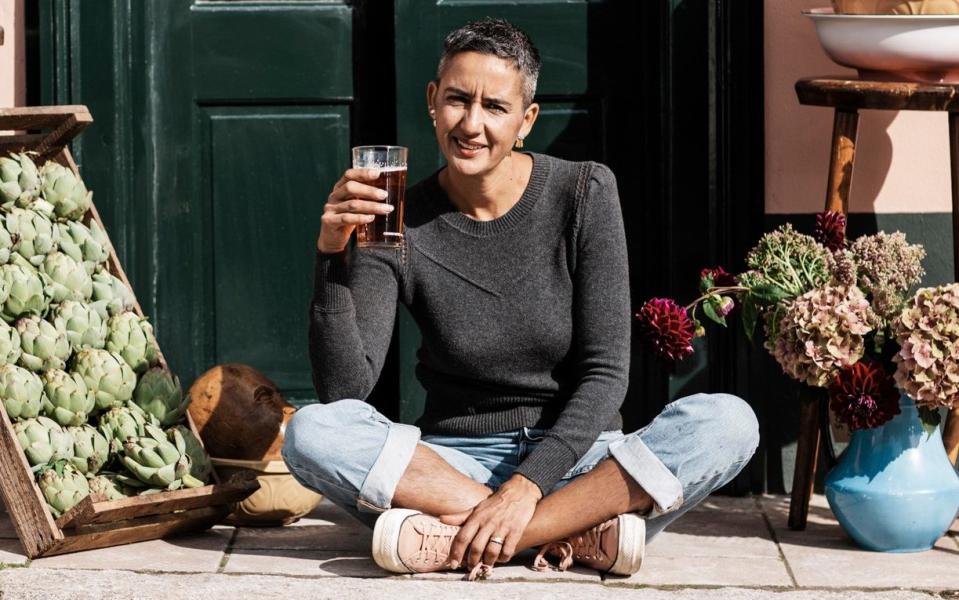
Tommy Banks rebooted his family’s farm in North Yorkshire after winning a Michelin star for his gastropub The Black Swan at Oldstead. The chef’s family had abandoned contract farming when Banks was growing up and his parents realised that offering accommodation as a farmhouse bed and breakfast was a more reliable source of income, which in turn led them to buy the village pub half a mile away.
“We made a decent go of it,” Banks deadpans with typical Yorkshire understatement, though he says that returning to farming was as much about combating the imposter syndrome he felt winning a star at the age of 24 as it was to provide food for the pub (and give his dad a sense of purpose).
The Bankses adopted regenerative farming practices when they found that 10 years of leaving the land fallow had turned the 160 acres into a hotbed of biodiversity. Today it produces everything from grass-fed Dexter cattle and Herdwick sheep to specialist fruit and veg, supplying not only The Black Swan but Banks’ Roots restaurant in York, his Made in Oldstead delivery boxes and his latest venture, The Abbey Inn at the nearby village of Byland.
Banks now employs 145 people across his business and makes no distinction between his pubs and the farm. “Turning the ingredients that we’re farming into a high-value product for the end consumer isn’t just a case of sending baskets of fruit and cuts of meat to the pub. It’s a very labour-intensive process. I have three chefs working full time on the farm who I would count as farm workers even though they are trained chefs. They do all the butchery, make the charcuterie, turn the milk into yoghurt and prepare the pickles, preserves and fermented vegetables. There is a level of infrastructure required to get towards the self-sufficiency that we’re aiming for.”
Banks remembers there being 15 kids getting on the school bus in Oldstead when he was growing up; now it’s just his niece and nephew in an area where few couples can afford to raise a family. The pubs and farm, at least, are keeping young people in the Yorkshire countryside.
“We have an apprenticeship scheme that starts at 16 and the average age of people who work for us is in the mid-20s,” Banks says. “The farm and the pubs are intrinsically linked. One doesn’t work without the other. So by connecting pubs with farming, you can create jobs for a community of young people that wouldn’t otherwise exist in a rural location.”
Geetie Singh-Watson estimates that only five per cent of UK pubs work along similarly socially conscious lines to The Bull Inn or The Culpeper Family. “A pub can only do that if it’s in control of its supply chains,” says Ed Bedington, editor of The Morning Advertiser, the trade paper for the pub industry. “The larger operations buy food centrally and by price. Provenance tends to go out of the window for whatever ingredient is cheapest, whether that comes from England, Ireland or Argentina.”
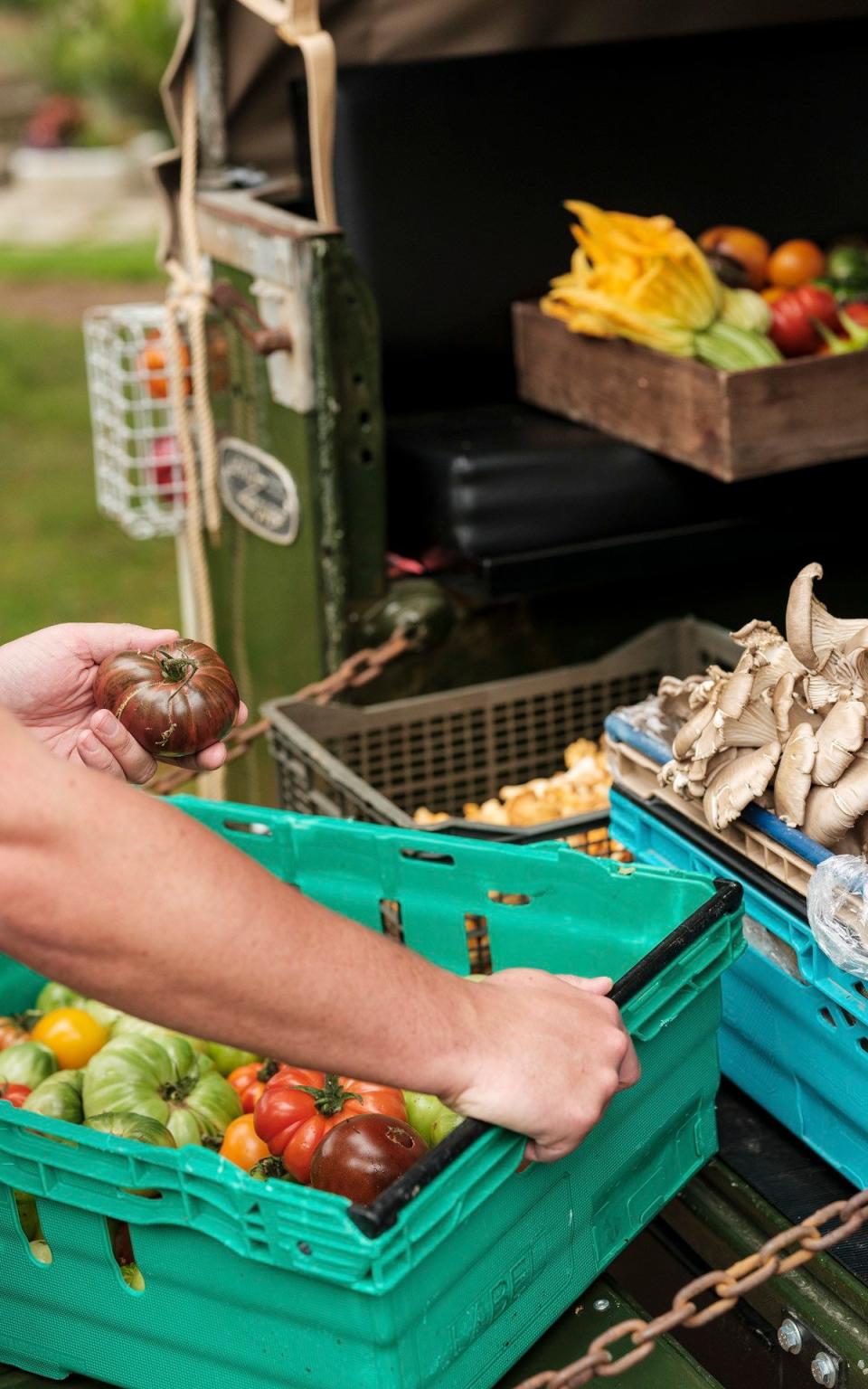
Pubs still command the biggest share of consumer spending in hospitality – 29 per cent – according to recent data from research consultancy KAM and the British Institute of Innkeeping. But the study also found that customers were migrating to fast food due to the cost-of-living crisis. Like the rest of hospitality, pubs are facing year-on-year energy price increases of 80 per cent, high inflation and high interest rates. Surely many publicans have better things to worry about than where the ingredients for their lasagne are coming from?
“To be honest, they probably do,” Bedington says. “There’s more of a survive than thrive mentality in the sector at the moment. Do operators really care about establishing a relationship with a farmer down the road if they can’t put those great products on the menu at a price their customers can afford? But the flip-side of that is that pub operators have to be much smarter in terms of giving people reasons to come in.”
Perhaps we need to begin reimagining how British farming looks in the 21st century. When Geetie Singh-Watson owned the Duke of Cambridge, she only bought British ingredients – which meant no lemons. Tommy Banks says that his grandfather would recognise the sort of regenerative farming now practised by the family. The Bull’s Thomas Jones has replaced the beds of tomato and basil with cavolo nero for winter. Yet do most pub-goers really want to return to the days when there was nothing to eat but brassicas for three months of the year, let alone no citrus fruit?
“Consumers aren’t going to change how they think,” says Greg Watts, the owner of the Bat & Ball near Fordingbridge on the edge of the New Forest. “They want to eat strawberries all year round.” When he bought the pub two and a half years ago, he converted 160 square metres, roughly half of its bramble-choked garden, into a vertical hydroponics system that uses no soil and 90 per cent less water than traditional farming techniques. “For eight months of the year,” Watts says, “we’re growing strawberries on site, which means no food miles or single-use plastics when we eat products like that during winter.”
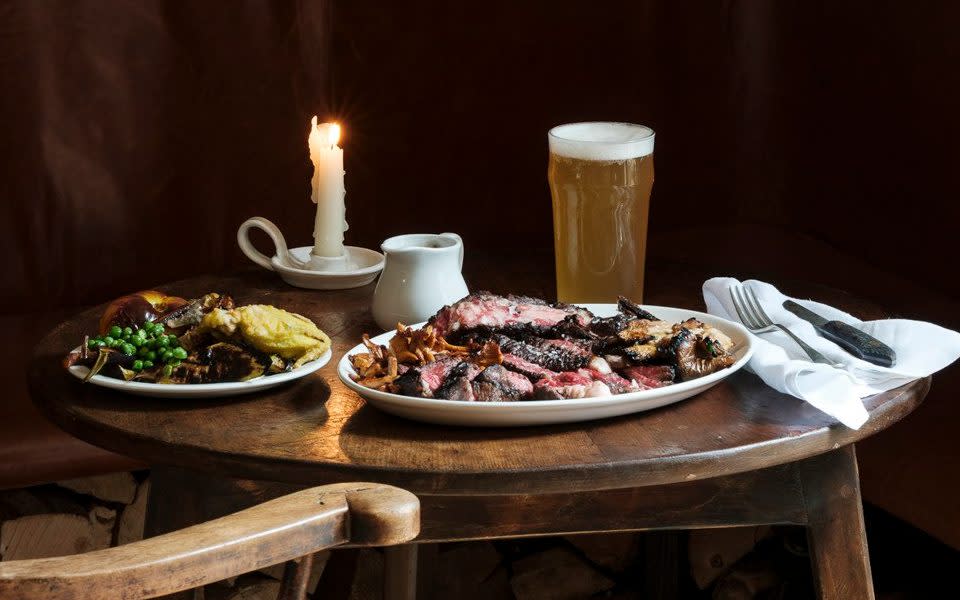
Watts admits that the tiers of tomatoes, peppers, cucumbers and courgettes growing in a polytunnel behind the pub lack the romance of traditional farming. But he is producing 50 per cent of the fruit and veg that the pub uses, as well as all the flowers for the pub’s hanging baskets. “If you can afford to lose three parking spaces, you can start growing hydroponically,” he says. “It’s not going to produce everything you need. But it will make a dent in your food miles and it saves money. You can’t solve everything in one go.”
Watts buys his meat from the local butcher, yet it is hard not to feel that his version of self-sufficiency feels more divorced from the local community. Must British farming be a struggle between the heart and the head?
“Pubs are the perfect place to work with farming,” says Phil Winser, back at The Bull in Charlbury. “We fit into a local ecosystem and a lot of the producers we use drink in the pub themselves. I’m not saying that pubs can save farming – yet. But I think they can help each other. And so far, it’s working.”

